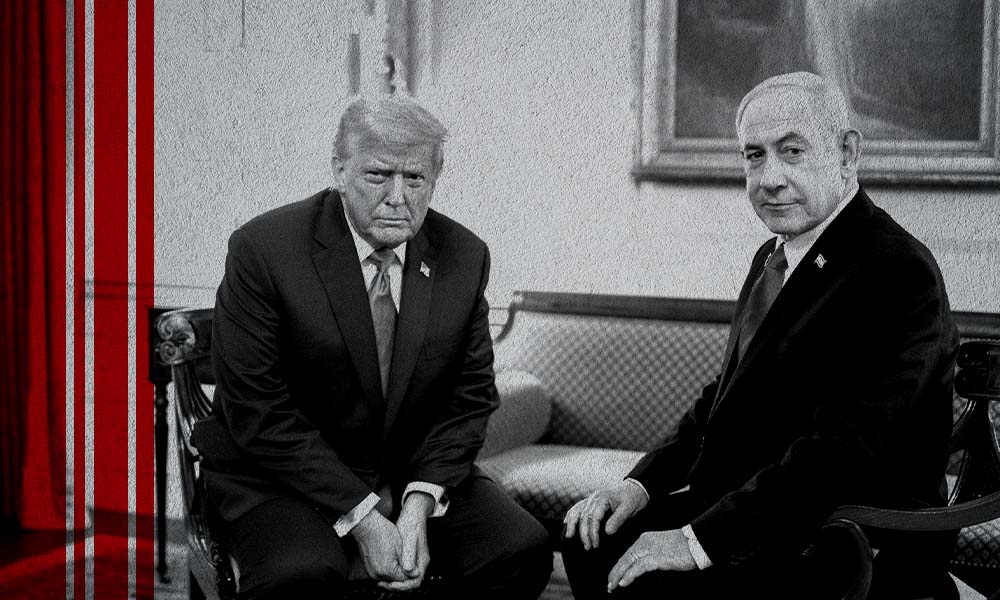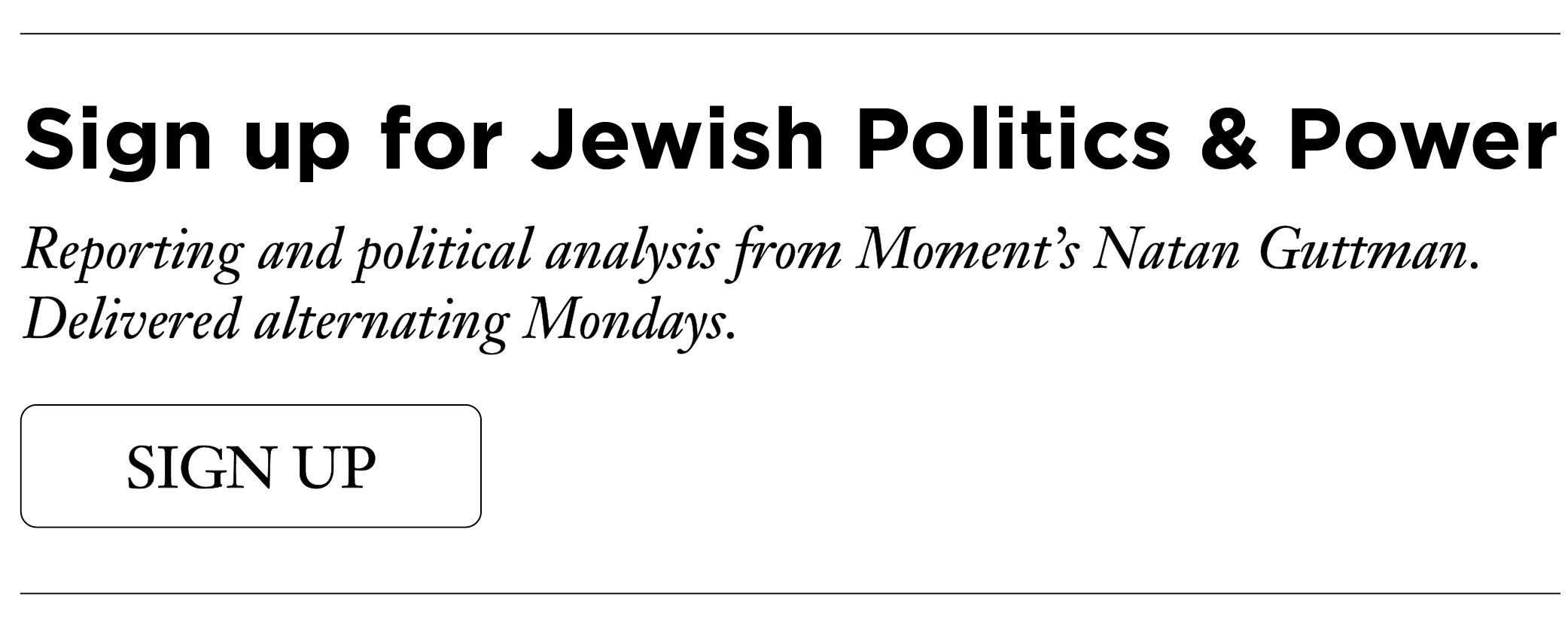
Jewish Politics & Power is published every other week. Sign up for our newsletter for updates.
1. An Unusual Setting
Benjamin Netanyahu’s Monday meeting with Donald Trump was framed by the White House as a “celebration” of the joint American-Israeli victory over Iran in June. Ever since the Israeli airstrike campaign, which was followed by an American final punch aimed at three Iranian nuclear sites, Trump has had nothing but praise for the Israeli leader, calling him a “war hero” and highlighting their great cooperation throughout the so-called 12-day war.
Fittingly, Trump hosted Netanyahu for dinner in the White House’s Blue Room, where, sitting along the rectangular dining table, both delegations indeed celebrated their military success, but also dove into the big issues facing the two countries now: winding down the Gaza war and establishing a post-war policy for Iran.
Netanyahu’s team wasn’t thrilled with the dinner arrangement. While appreciative of the gesture, they were also aware of the fact that an evening in Washington means the middle of the night in Israel, thus causing Netanyahu to miss the TV prime time for his White House victory lap.
Not to mention the unusual decision by the White House to keep the press out of the meeting and avoid even the customary photo opportunity at the top of the event. But worry not: Trump—who has rarely if ever passed on an opportunity to engage with the press—eventually invited reporters in for a short photo session, which turned into a full-fledged 40-minute press conference.
This unusual setting for a bilateral meeting seemed to work well for both sides: Netanyahu got his chance to show the Israeli people that despite his low approval ratings, he still has the most powerful man in the world as his bestie. And Trump had an opportunity to assert his role as the leader of historic change in the Middle East, while using the intimate environment to nudge Bibi into showing more flexibility in order to make a Gaza ceasefire a reality.
2. High Expectations, Mediocre Results
The deliverables from the meeting were modest. An understanding on the need to push forward for a ceasefire; initial discussions on the outlines of a final agreement to end the war; and an increased awareness of Israel’s need to go back and attack Iran if and when Tehran resumes its nuclear activity.
These are all important, but after a week of dramatic build-up in the Israeli press and after systematic leaks promising a meeting that will change the face of the region forever, they seem a little disappointing.
In the run-up to the meeting, officials on both sides spread rumors of dramatic breakthroughs that were about to take place during Netanyahu’s visit to Washington: finalizing a ceasefire agreement with Hamas; America providing Israel with an actual green light to keep on bombing in Iran, if needed; starting the process of normalization with Syria; and even an announcement of expanding the Abraham Accords and bringing new Arab countries into the fold.
Soon enough, it became clear that these pie-in-the-sky expectations could never be met. The Gaza deal is close, but there are still disagreements that need to be ironed out. And normalization efforts, both with Syria and with other Arab and Muslim countries, still require a lot of work before they can be announced.
Bibi left the White House with the good feeling that he’s on the same page as Trump but without a crowning achievement. It may still come, but the timing was just not right.
3. Closing the Gaza Deal
The deal, both Trump and Netanyahu said, is almost complete.
“I think things are going very well,” Trump told reporters during his dinner with Netanyahu. His special envoy to the region Steve Witkoff added: “We have an opportunity to finally get a peace deal, Mr. Prime Minister.” Witkoff is leaving for Doha today to help push the negotiations between Israel and Hamas across the finish line.
The obstacles, said a senior Israeli official briefing reporters after the meeting, are minor. “Israel got 80-90 percent of what it wanted,” the official said, noting that negotiations may still require a few days or even a week. The differences center on the question of the exact areas in Gaza that Israeli forces will withdraw from during the ceasefire, and on Hamas’s demand that humanitarian aid is brought into Gaza through the UN and and other international organizations, instead of the US-backed Gaza Humanitarian Fund.
A deal would include the release of 10 of the 20 hostages presumed to be alive, and of 18 bodies. The release would be spread over 60 days, a time period of ceasefire during which both sides would be required to negotiate a final end to the war.
And this is where the seeds of a possible clash between Netanyahu and Trump rest: The U.S. president made no secret of his wish to end the war as early as possible. Netanyahu, in his actions, indicated he’s not open to that idea until Hamas is demilitarized and out of power in Gaza, two requirements that are hard to define and difficult to implement.
And then there’s the day-after question, which also came up during Monday’s meeting. Israel, Netanyahu said, is not ruling out the option of remaining in charge of Gaza even after the war ends. It might also be open to some kind of a ruling mechanism operated by the Palestinian Authority. The two leaders, according to an Israeli source, also discussed Trump’s idea of the “Gaza Riviera,” a notion floated by the American president months ago, in which all Palestinians will be evacuated from Gaza and resettled in other countries, while the United States takes over the region and rebuilds it as a lucrative piece of ocean-front real estate.
Interestingly, while Trump seems to be less enthused about his own idea, Bibi is still all in. “It’s a brilliant vision; it’s called free choice!” Netanyhau exclaimed. “If people want to stay they can stay,” he said, adding that he is in the process of finding several countries that will be willing to take in Gazans.
4. The Iran Gap
The Israeli-American cooperation last month in attacking Iran’s nuclear facilities may have been the reason for Netanyahu’s visit to Washington, but it is clearly not an issue on which both leaders see eye-to-eye.
In the meeting, Trump told Netanyahu that he intends to send negotiators to meet with Iranian officials next week in order to begin work on a new nuclear deal. The president also spoke of the need for a “final agreement” that will not only resolve the nuclear issue but also formalize the ceasefire reached after 12 days of Israel and Iran exchanging missiles and airstrikes. “We have scheduled Iran talks, and they want to talk. They took a big drubbing, I think, when we hit the three sites,” Trump said, adding that he would “love to be able to, at the right time, take the sanctions off. Give them a chance at rebuilding, because I’d like to see Iran build itself back up in a peaceful manner.”
That’s not what Netanyahu wanted to hear. The Israeli leader stressed the need for vigilance in the face of Iran’s still-existing nuclear ambitions, and told Trump that if the ayatollahs try to go back to developing nuclear capabilities, Israel will feel free to attack again. Trump, when asked if the United States would join such an attack, responded: “I hope we’re not going to have to do that. I can’t imagine wanting to do that. I can’t imagine them wanting to do it.”
5. Flattery Will Get you Everywhere
No one has ever gotten punished for sucking up to a powerful man.
With this lesson in mind, Netanyahu offered an awkward gesture to Trump during their meeting. Waiting until reporters and TV cameras were let into the room, Bibi ceremonially handed Trump a letter he had written to the Nobel Peace Prize committee, recommending they give the lucrative award to Trump.
Trump, who has never been averse to flattery, has an issue with the Nobel Prize. He believes he deserved it in his first term, he’s sure that now he’s the ideal candidate for this honor and, most important, he never forgave the committee for awarding it to Barack Obama in 2009.
Trump loved Netanyahu’s gesture, but it is an empty move.
Others have already nominated Trump for the award, and it’s hard to see how the European-based committee will pay attention to a Peace Prize recommendation coming from an Israeli leader who is accused by the International Criminal Court of committing war crimes.
Top image: Donald Trump and Benjamin Netanyahu (Credit: Official White House Photo by Daniel Torok).


